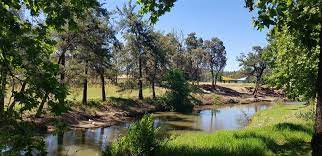Rabbit control program starts in Coonabarabran
Luke Williams
06 July 2023, 9:20 PM
 Image: Invasive Species Council.
Image: Invasive Species Council. Coonabarabran Landcare Inc will be conducting an intensive rabbit control program at the Nandi East Reserve after it found that rabbits were killing the trees it had planted as part of its revegetation program.
Wes Leedam told the Western Plains App, "Our group has just planted 800 trees at the Reserve. The rabbits has been decimating all the new seedlings" on the site just on the outskirts of Coonabarabran's west.
Many of the trees - which include a range of species and sub-species, are designed to reflect the river-side ecosystem of the area before settlement - have actually died as a result of the rabbits feeding on them.
"The replantation is very important because it's where the land meets the water, and so it's a place which provides life to a whole diversity of species," Leedham explained.
"Even though we have guards and everything around them, the cheeky rabbits are still making an absolute meal of them."
It's estimated that around 70 rabbits are living on the reserve.
The group will work with Local Landcare Services to implement the use of a poison called Pindone, which will be embedded in carrots.
The chopped carrots will be placed in a little freshly dug ditch - as rabbits are attracted to fresh earth. Initially, the carrots will not contain the poison, which the group will gradually introduce to the vegetable once the rabbits get into a feeding regime.
Pindone is used to reduce rabbit populations in areas where it is impractical or unsuitable to use 1080 - that is, in semi-urban areas like the Nandi East Reserve.

The Nandi East Reserve is adjacent to the Castlereagh River. Image: Warrumbungle Shire Council.
The poison causes internal hemorrhaging, the rabbits will need to ingest the poison several times, and it takes three to five days to work.
"But it's the most humane and effective method available to us," Leedham explained, reiterating his goal of restoring the area to its pre-colonial condition.
"That involves three feeding days two days apart commencing the first week of July."
"The numbers have exploded, and there has been no eradication at the site for quite some time".
In 1859, European rabbits were introduced into the Australian wild so that they could be hunted recreationally.
It all started when Thomas Austin, a wealthy settler, introduced thirteen European wild rabbits to his state of Victoria.
Today there are more than 200 million European rabbits in the Australian wilds and rural landscapes.
Leedham said the group is aiming for complete eradication of the species from the site.
The group advises that people should muzzle dogs when visiting the area and cats living near the park should be confined indoors during the Program, which will take place throughout July.
The site will also be fenced off and not available for public use when the Program starts.




